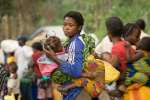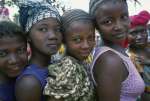UNHCR warns of "looming refugee crisis" in the Americas
News Stories, 28 October 2015
Oct 28 (UNHCR) – In late 2014, four members of a brutal street gang abducted Norma and took her to a cemetery nearby her home in El Salvador. Three of the four then raped her. She believes she was targeted because she was married to a police officer.
"They took their turns…they tied me by the hands. They stuffed my mouth so I would not scream." When it was over, she said, "They threw me in the trash."
Despite the fact that her husband is a police officer and that the couple had filed an official report, Norma * became increasingly concerned that she could not be protected from the gang, a powerful transnational armed group that has a significant presence across the region.
Gang members had already forced her to pay a "cuota" every two weeks for protection and threatened her children. After the rape, she lived in imminent fear for their lives. "They'd kill me. Gangs don't forgive.…If they didn't harm me, they'd harm my children," she said.
Norma tried to find safety by going to live with her aunt and uncle in another part of El Salvador. She changed her phone number and never left the house. Nonetheless, she and her family were continually threatened. Having no other option, she and her husband decided that she should leave the country. Norma fled through Mexico with a "coyote," or human smuggler before eventually crossing into the United States where she sought asylum.
Before she fled, Norma wanted to withdraw the police report, "so no one left behind would be hurt." However, Norma said her children, who live with her husband in their Central American homeland, "are still being threatened."
Norma is among thousands of women from El Salvador, Honduras, Guatemala and parts of Mexico who are fleeing in increased numbers from a surge in deadly, unchecked gang violence in their homelands. The ongoing exodus from the region – which has some of the highest murder rates in the world, especially of women – is fuelling a looming refugee crisis in the Americas, the United Nations refugee agency warned on Wednesday.
"The violence being perpetrated by organized, transnational criminal groups in El Salvador, Guatemala, Honduras and certain parts of Mexico has become pervasive," UN High Commissioner for Refugees António Guterres said in Washington at a news conference to mark the release of a report on the situation entitled "Women on the Run." "The dramatic refugee crises we are witnessing in the world today are not confined to the Middle East or Africa ... We are seeing another refugee situation unfolding in the Americas."
The new UNHCR report draws on interviews with160 women who related their harrowing experiences of rape, assault, extortion and threats by members of the murderous street gangs. They talked about their families contending with gunfights, disappearances and death threats. They described seeing family members murdered or abducted and watching their children forcibly recruited by those groups.
Guterres called the study an "early warning to raise awareness of the challenges refugee women face and a call to action to respond regionally to a looming refugee crisis."
In response to the crisis, the UN refugee agency wants all countries in Central and North America to recognize a growing refugee situation in the region, and establish an adequate capacity at borders to ensure the identification of persons in need of international protection.
While some of the women flee to the United States in search of safety, many others escape to neighbouring states in Central America and Mexico where applications for asylum from people fleeing El Salvador, Guatemala, Honduras and parts of Mexico – have skyrocketed thirteenfold since 2008.
According to U.S. government statistics, 82 percent of 16,077 women from these countries who were interviewed by U.S. authorities in the last year were found to have a credible fear of persecution or torture and were allowed to pursue their claims for asylum in the United States.
*Norma's name has been changed to protect her identity










































